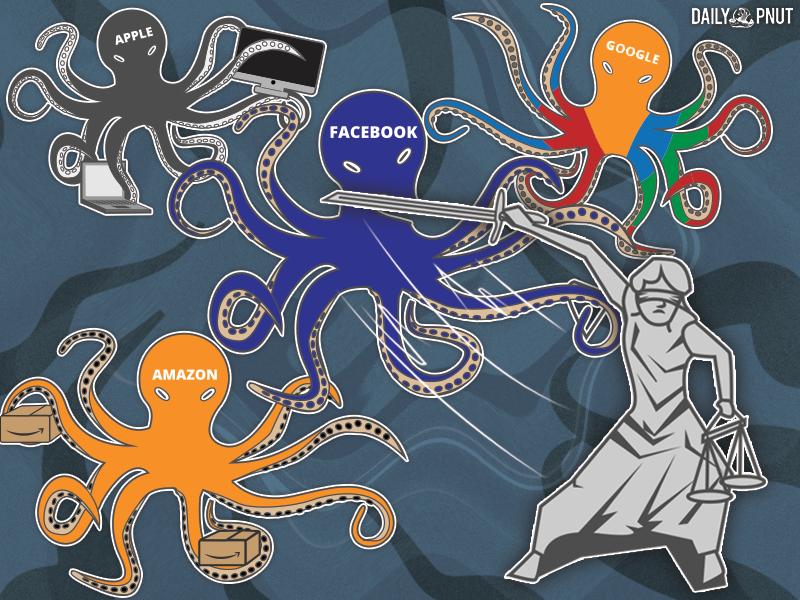The Eyes of the World Are Upon You
June 6, 2019

“In preparing for battle I have always found that plans are useless, but planning is indispensable.” – Dwight D. Eisenhower
“We have always held to the hope, the belief, the conviction that there is a better life, a better world, beyond the horizon.” – Franklin D. Roosevelt
General Eisenhower’s Order of the Day on June 6, 1944
The Speech Eisenhower Never Gave On The Normandy Invasion (NPR)

Lady Liberty Cancels Her Family Plan
Tuesday’s Daily Pnut wrote on the increasing attention government agencies are paying to a handful of giant tech companies in Silicon Valley. The Trump Justice Department and FTC appear to have their antitrust antennae up and pointed at the likes of Google, Facebook, Amazon and Apple. The agencies could begin investigations or even bring lawsuits over competition, e-commerce and social networking complaints. But what is really driving this backlash against ‘bigtech,’ and why is the Trump administration giving ‘bigtelecom’ a pass ?
Google, Amazon, Facebook, Apple (“GAFA”) and Microsoft, are the biggest companies providing technological services related to computers. The tendency for critics is to lump these companies together into one ‘bigtech industry,’ or worse, monopoly, and demonize it as being too powerful. Telecommunications (telecom) giants such as AT&T, Verizon or Qwest that provide voice and data ‘transmission services’ through technological means, like physical electrical cables, or electromagnetic waves in space, are equally powerful but operating completely under the administration’s radar.
For years telecom lobbyists have urged heavier regulation of Silicon Valley, something that would advance their own agendas to compete with tech companies like Google in the online ad space. President Trump has advanced these efforts by appointing former Verizon lawyers Ajit Pai to head the FCC and Bill Barr to head DOJ. Within months of Pai’s appointment the Obama-era net neutrality consumer protection rules were repealed. FCC oversight of telecom companies is now virtually nonexistent, and states are increasingly being prevented from protecting consumers against telecom giants like AT&T and Comcast that already enjoy natural monopolies over access to the internet.
- Why does Washington suddenly seem ready to regulate Big Tech? Look at the polls (Vox)
- Big Tech’s antitrust problems are just beginning (WaPo, $)
- Tech Giants Amass a Lobbying Army for an Epic Washington Battle (NYT, $)

Can You Deal Me Now? Good.
- Two economists have come up with their theory to explain why the crime rate has been steadily falling since the early 1990s. Their data is laid out in a new National Bureau of Economic Research working paper.
- The economists estimate that the diffusion of mobile phones could be the reason for the de-escalation of the gang turf wars that tore up cities in the 1980s, and explain the 19 to 29 percent of the decline in homicides seen from 1990 to 2000.
- The intriguing new theory suggests that the arrival of mobile phones made holding territory less important, which reduced intergang conflict and lowered profits from drug sales.
- “The cellphones changed how drugs were dealt,” one of the economists said, meaning the cellphone broke the link between turf and selling drugs. (Atlantic)
- Additional read: “Gun violence has sharply declined in California’s Bay Area. What happened? “ (Guardian)
If You Don’t Have Anything Nice To Say, Tell Us Where You Live
- Democracies around the globe, from the US to the Philippines, are increasingly targeting journalists and cracking down on leakers, whistleblowers, critics and information sharers. President Trump leads the verbal charge, calling news media the ‘enemy of the people.’
- Of those democracies, Australia’s approach to preserving its secrets might be the most aggressive. Reporters are investigated, and one had her home raided.
- On Wednesday the federal police served a warrant on Australia’s main public broadcaster to produce all notes, story pitches, emails and diaries, for the entire teams of journalists and senior editors, in connection with a 2017 article about Australian special forces being investigated over possible war crimes in Afghanistan. Experts say it’s just the latest example of how far the country’s conservative government will go to scare officials and reporters into submission. (NYT)
Microplastic Might Be A Macro Problem
- In the first study of its kind, published in the journal Environmental Science and Technology, scientists report that the average person ingests at least 50,000 particles of microplastics a year, and breathes in a similar quantity. Microplastic pollution comes primarily from the disintegration of plastic litter; it is found everywhere — in the air, soil, rivers and the deepest oceans around the world.
- Drinking a lot of bottled water drastically increases the particles consumed. Only a small number of foods and drinks have been analyzed for plastic contamination so the true number is likely many times higher.
- The health impacts of ingesting microplastic are unknown, but they could possibly release toxic substances. Some particles are tiny enough to penetrate human tissues, which could trigger immune reactions. (Guardian)
Environmental D-Day
- The ‘Great Dying’ Nearly Erased Life On Earth. Scientists See Similarities To Today (NPR)
- New Report Suggests ‘High Likelihood of Human Civilization Coming to an End’ Starting in 2050: The climate change analysis was written by a former fossil fuel executive and backed by the former chief of Australia’s military. (Vice)
- The climate crisis is our third world war. It needs a bold response: Critics of the Green New Deal ask if we can afford it. But we can’t afford not to: our civilisation is at stake (Guardian)
- Those Tiny Hotel Toiletry Bottles Are on Their Way Out (NYT, $)
- Too Many People Want to Travel: Massive crowds are causing environmental degradation, dangerous conditions, and the immiseration and pricing-out of locals. (The Atlantic)

Honoring Those Who Fell So We Could Stand
- The leaders of 16 countries involved in WWII joined with England’s Queen Elizabeth Wednesday as she kicked off a two day commemoration of the 75th anniversary of D-Day, a pivotal invasion by Allied forces of Nazi-occupied France. President Trump was among the group, which included German Chancellor Angela Merkel, joining the Queen in Portsmouth.
- The spot is on the southern coast of England and was one of the main launching points for the assault. Allied forces landed on the beaches of northern France the morning of June 6, 1944. By day’s end more than 4,400 soldiers had lost their lives, but the invasion gave the Allies the foothold they need to help bring down Adolph Hitler’s war machine.
- Taking part in commemorations this week on England’s coast and in Normandy, France are veterans of that epic conflict, several of whom are featured in video testimonies, telling their stories and remembering their comrades who died that bloody day. (NPR)
- Additional trailer: Saving Private Ryan Trailer
- The Man Who Told America the Truth About D-Day (NYT, $)
- The top-secret meeting that helped win D-Day: One of the best-kept secrets of World War Two is that D-Day was planned in a remote hunting lodge in south-west Scotland 75 years ago. Or was it? (BBC)
H2uh-Oh
- Five US cities are particularly vulnerable to running out of water. Population growth, poor planning and climate change have put such stress on water supplies that legal battles have erupted between states. El Paso, Texas and Phoenix, Arizona both sit in the middle of deserts, in states with very fast growing populations.
- Arizona and six other southwestern states currently rely on the Colorado River for drinking water, a fact that won’t be sustainable in the future.
- Los Angeles must import most of its water from the northern part of the state and the Colorado River.
- Miami, Florida is surrounded by water, but it’s saltwater. Climate change is causing rising sea levels, and seawater is seeping into Miami’s aquifer.
- Atlanta, Georgia gets more than 70 percent of its water supply from the Chattahoochee River Basin.
- Georgia, Alabama and Florida have been in legal battles for years over how much water can be taken from two basins, and rulings against Georgia could severely affect Atlanta’s water supplies. (Weather.com)

f(Nature, Nurture) = The Science Of Shyness
- Discussions about human behavior are bound to revolve around the Nature or Nurture dichotomy. Take shyness, for example. Turns out only about 30 percent of shyness as a trait is genetic, according to Thalia Eley, professor of developmental behavioral genetics at Kings College London. The rest is a response to the environment.
- Most of what we know about the genetics of shyness comes from studies that compare shyness in identical twins, who are perfect genetic copies of each other, with non-identical twins, who only share about half of the same genes.
- Eley says the environment is almost more important for developing traits like shyness, but its genetics that drives us to extract aspects of the environment that match our actual predispositions.
- A shy child may be more likely to isolate themselves in a playground and watch everybody else rather than engaging. That then makes them feel more comfortable being on their own because that becomes their common experience.
- “It’s not … one or the other; it’s both [genes and environment] and they work together,” she explains. “And because of that, you can always change [shyness] through psychological therapies that can teach you techniques to cope.” (BBC)

